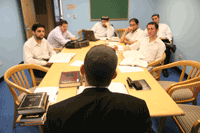Happenings at the Yeshiva
 I received a number of halakhic questions this week regarding snow and Shabbat. Is snow muktzeh or nolad (considered newly created) if it fell on Shabbat? (No - Shulkhan Arukh OH 338:8, and Mishne Brurah no. 30 regarding rain, and Har Tzvi, Tel Harim, Soter regarding snow). Can one make snowballs or snowmen? (No - it is at least rabbinic boneh, building, see Rambam Shabbat 7:6). Can one shovel the snow on Shabbat? (If it has hardened, this may be a form of boneh, at least rabbinically - creating a path, or possibly soter, destroying. (See Har Tzvi, Tel Harim, Soter.) If it has not hardened, it would at most be an issue of tircha, exertion, or uvdah di'chol, weekday activity. One could certainly allow having a non-Jew do this, as there is no problem to ask a non-Jew to do acts which are uvda di'chol and tircha. Even if it had hardened, if there was any concern for safety, it could certainly be done by a non-Jew. Breaking ice can certainly be done if there is need - (see Shulkahn Arukh OH 320:10.)
I received a number of halakhic questions this week regarding snow and Shabbat. Is snow muktzeh or nolad (considered newly created) if it fell on Shabbat? (No - Shulkhan Arukh OH 338:8, and Mishne Brurah no. 30 regarding rain, and Har Tzvi, Tel Harim, Soter regarding snow). Can one make snowballs or snowmen? (No - it is at least rabbinic boneh, building, see Rambam Shabbat 7:6). Can one shovel the snow on Shabbat? (If it has hardened, this may be a form of boneh, at least rabbinically - creating a path, or possibly soter, destroying. (See Har Tzvi, Tel Harim, Soter.) If it has not hardened, it would at most be an issue of tircha, exertion, or uvdah di'chol, weekday activity. One could certainly allow having a non-Jew do this, as there is no problem to ask a non-Jew to do acts which are uvda di'chol and tircha. Even if it had hardened, if there was any concern for safety, it could certainly be done by a non-Jew. Breaking ice can certainly be done if there is need - (see Shulkahn Arukh OH 320:10.)On Wednesday, the day of the major snowstorm, Rabbi Josh Feigelson, one of our first musmachim and Hillel Rabbi of Northwestern University, visited the yeshiva. He spoke to the students, expounding on the story when Yaakov left Canaan and had the dream where he saw God, and then awoke saying, "Behold, God is in this place and I did not know." R. Feigelson told the students that in many ways this story reflects the reality of young adults - leaving home, going out to find a mate and profession, to make a name for themselves, and having the opportunity to see reality differently, to dream, to break forth, to ask the big questions, and to realize that "God was in this place" - to make meaning of their experiences, and to define their world and define them for life.
Rabbi Feigelson told the students that as a rabbi, they would hold the privileged position of being able to ask the questions that no one else got to ask, that they would be able to challenge and guide people about the choices they are making, the path they are setting themselves on, the way they are going to make their name in the world, how they would most actualize their tzelem E-lohim in the world. And that in the case of a campus rabbis, they would be able to raise these questions at a critical juncture in people's lives, when people are emerging adults, defining their identity. Rabbi Feigelson finally shared some stories where he had the opportunity to do just this, and then took questions and engaged the students' questions.
Another one of our musmachim was in the news this week. A mazel tov to our own Rabbi Akiva Herzfeld, for topping the list of Portland's most influential people, as reported in The Phoenix! As the article remarks:
He works to connect the generations - allowing older members of his congregation to continue in aspects of Jewish life they have long found meaningful, while also reaching out to young people - as in his annual college-student get-together at Shaarey Tphiloh, when he invites Jewish students from colleges around Maine and New England to spend a weekend at the synagogue (and attend a hockey game with other congregation members, young and old).
Beyond hisown community, Herzfeld is making a name for himself in the civic life of greater Portland. When Shaarey Tphiloh was vandalized by people who painted swastikas on the sign outside the building, he got in touch with a wide range of people - obviously the police, but also community organizations, and other religious groups - and held a rally to condemn hate as a way of responding to the incident. He's also willing to stop and chat when he sees people looking quizzically at his yarmulke, or is approached on the street to talk about Israel or Judaism. And he just gave an invocation at the NAACP breakfast for Martin Luther King Day...
"Jewish tradition and Jewish values have a lot to offer for people in Maine," he says, noting that one of the security issues he discussed was a report that an airplane passenger had become alarmed upon seeing a fellow passenger - a devout Jew, as it turned out - preparing for prayer by putting on tefillin, small boxes containing tiny copies of the Torah that are strapped to the arms and head during worship.
Mazel Tov, Akiva! Continue the great work bringing Torah to Klal Yisrael and to the larger world!
Comments
Post a Comment